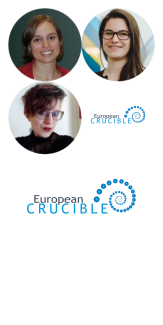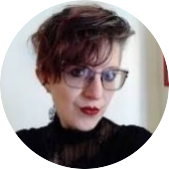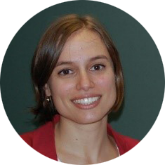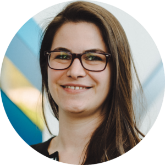Science Communication
Project: “Science and Human Histories”
Scotland – Netherlands – Spain
Has public confidence in the ethics and capacities of science declined in recent times? Topics such as climate change, vaccines, telecommunications, food safety, and most recently COVID-19 have been the subject of debate. This project examines one of the key factors which lies behind the conflict between science and its critics: specifically, the way in which science is, and has been, communicated to society.
The team expertise for this Societal Challenge is in Museum Studies and Physics:
Dr Jennifer Walklate, |
Dr Veronica Gonzalez-Fernandez, |
Dr Antonija Grubisic-Cabo, |
Episode
6

Welcome to another in our short series of European Crucible podcasts. A very interesting subject today, a very interesting project today. And something quite close to one of my interests in life science communication.
But I'll get on to the details later after I will have introduced our three participants. And I'm going to start with Antonia. Can you introduce yourself? Hi everyone.
I'm Antonia Grubisicciavo and I'm an assistant professor at the University of Groninge in the Netherlands. I'm actually a physicist and I mostly work with, well,
what we call 2D materials, nanomaterials, study very basic properties of materials with different spectroscopic techniques. Yeah, so in short, you do advanced work on advanced materials.
Exactly. Perfect. Okay, Veronica.
Hi everyone, my name is Veronica Bonfalle Fernández, I'm an assistant professor at the University of Complutense de Madrid in Spain.
I'm also a physicist and I am working in the optics domain, mainly in also in spectroscopy, but also in developing different optical diagnostics for physical systems.
Including exotic things like tocomax that we use for nuclear fusion? - Yeah, my PhD thesis was about developing plasma diagnostic via optical techniques.
Yeah. - And thirdly, uncontrastingly, I'm going to say we come to Jen.
Hi, hello, I'm Jen Walkley. I'm a lecturer in museum studies at the University of Aberdeens Anthropology Department.
And I am neither a physicist nor an anthropologist. I'm an historian and museologist and I've been working in and around the museum sector for close to 20 years now.
I work primarily in collections histories at the moment, researching the historical development of museums as institutions.I'm also an historian of science.
Already people listening to this might be thinking, hang on, we've got somebody who does advanced materials and somebody's in optics and somebody who's in museology,
how are they gonna combine? But we'll get onto that after perhaps we start with how you got involved with crucible in the first place. And Jen, we'll stick with you since you're there. - Sure, absolutely.
So a number of my colleagues at the University of Aberdeen have been involved in crucible projects in the past and when I saw the opportunity appear in my inbox,
as it were, I spoke with a number of those colleagues and they felt like it would be a good fit for me as somebody who works in a fairly interdisciplinary context.
One thing I will say is that museology or museum studies, whichever you prefer, it's not a discipline per se, it's a field. So crucible seemed like a really good fit.
Yeah, you're kind of pre -programmed to be interdisciplinary. Yeah, exactly. Veronica, how did you come across crucible and what were you hoping to get from it? It's a fun story because I had a friend who told me about the crucible and we made the promise of applying both of us together,
and finally she didn't apply. So it was all by myself. And I went along to that. But reading the, the scopes of the, of the program,
at the moment, I was recently entering the, in the, my, my actual university. And I was like, changing a little bit my research topic.
So I thought that it was an excellent opportunity to see what other people was doing outside of my film and maybe searching for different connections and different applications of the knowledge I have to another kind of field.
So that was my motivation. So although it can help with leadership skills and although it can help with communication, this was really about sticking your head above the wall and seeing what other people in other areas were doing and how it might relate to your own work.
Yeah, absolutely. Antonia, same question to you. Well, actually, when I was applying for Crucible, I was still a postdoc and, you know, starting to apply for permanent positions.
And I was in Sweden and one of the recently joined professors that I'm friends on Twitter. He posted about Crucible and how great it is to, Well,
meet new colleagues, develop leadership skills. So I dropped him a message and he really like super recommended applying. He even helped me with applications. So I did it to develop leadership skills and also meet people that,
you know, maybe I usually wouldn't meet because in particular at that time it was COVID. So it's not like you could go places and meet people from different disciplines, different fields. So it was great to also build a broader network.
But you did do this online, didn't you, so was it a little disappointing not to have more of the physical interaction? I think some activities would have been much easier in person because you know how it was during COVID with all the connection issues and in particular for speed dating that we had with other participants.
I found that one really tough because at some point the software, at least on my computer, just decided to give up. - And because people could listen to these podcasts in any order, I'd probably ought to say,
even though if they've listened to others, they'll know this by now. When you say speed dating, it is not. We stress actual dating. This is speed networking. There is no romantic element to this. - Maybe only romantic,
joint romantic interest for the topic. - What, Veronica, was the bit about this that you were least looking forward to, or that came as most of a surprise to you from what you expected Crucible to be like?
Well, very good question. I was surprised by the diversity of the profiles and at the end how much between different people because really in this speed networking I talk with several people and it was like I don't remember well but one minute,
one minute and a half of the of the conversation and really you get a whole impression of the profile of these people and talking about things that maybe you have in common that never thought and that was really satisfying.
It's a very unacademic way of doing things. We tend to have long meetings and symposia and seminars and conferences but the idea that you can actually usefully communicate something about yourself in just 60 seconds it's alien but it's true you can do it.
Yeah absolutely that was surprising but as I said very satisfying because really you have like a connection with someone and this kind of project is the proof of it.
And Jen what about for you you obviously as you say there's a strong tradition in Aberdeen of being involved did you pretty much know what to expect before you got there? I wasn't entirely sure but I knew I wanted to take part.
As someone who works in the field that I do, communication is key to what we do. Maybe I was surprised, I think, by the fact that I feel like I ended up with a lot more in common with some folks from the hard sciences,
and maybe that was due to a population demographic of the group that we had. We had a lot of what you might traditionally call hard sciences folks in that cohort,
but they were very varied. And I think that was quite interesting for me. It was, in a sense, easier to explain what I do to those folks than maybe some of my colleagues in politics or international relations,
strangely enough. I can hear you there applying your museological skills to how the arrangements of the people within with inclusible interacts and what the demographics might be as well.
So were you maybe just a little bit worried ahead of it that the people from the sciences would kind of cluster together and you'd be left a little bit on the outside? I was a little concerned perhaps that a museum studies individual would be perceived as someone whose main role was to facilitate the communication of other people's ideas,
which is not what I wanted at all because I feel like as a field of study we have our own ideas and a lot of them are pretty cool. So I've put it off as long as possible,
Antonia, but we're going to have to get to this. How did you Start to gravitate towards each other. What what made you think hang on? These are not just interesting people to talk to these might be interesting people to do a project with so for me It was well during the speed networking because you know it has to be people that are interesting to talk to but there has to be some overlap and When we were chatting
both Veronica and I are we're interested in science communications so we're both quite active in the field of science communication different kinds of outreach. And, you know, Jen is a historian,
and she also works with history of science. So I was thinking, well, maybe there's some overlap there, and it would be great to talk to these people about if there's something we can do together.
And Jen, from your point of view, I can see why you, with an interest in history and science communication, would want to do a project along those lines. But what made you think that these two, with their hard science backgrounds with the people to do it with.
Here at Aberdeen we have an amazing natural philosophy collection which has been built up over the last 200 years. I felt that it would be very useful to gain a modern physicist's perspective.
I also really I think I wanted to promote Aberdeen as a location for scientific thinking in the historical sense.
It's very easy to talk about the Enlightenment and the development of contemporary scientific study and very much locate that in London or Edinburgh.
But Aberdeen had its own specific flavor of enlightenment and its own relationship with the scientific revolution and we've got such fantastic natural philosophy collections here that I was really keen to bring in people who might be able to talk with me about how those collections and artifacts resonate with contemporary practice.
I've got to jump in here with a footnote because there might just be some people who are unfamiliar with the term, but natural philosophers was what scientists were known as before the word scientist was coined by,
I think, William Hewell in the 1880s. Yes, to all intents and purposes. So natural philosophy changed somewhat over the course of the term's history,
if you like. Aberdeen actually still does a natural philosophy degree, believe it or not. Oh. And our physics department was the natural philosophy department all the way up into the late 1980s.
Veronica, the three of you were talking, you're interested in science communication and you're interested in the history of science communication, but how did that coalesce into your project? Because we haven't really said much about what your project is yet.
Well, I rushed to the project because I was very impressed by the presentation that Antonia did at the first day. So talking about the most physical side of our research,
she told me she was already engaged in the project with Bien in this idea. And immediately I got caught by the idea because I am doing an outreach during my PhD and my career.
So that seems to me like a fantastic, fantastic idea. So I was doing, I'm doing more like practical outreach like bringing science to society,
but the project of comparing how this science communication was still in the past with how we are doing this science communication right now at the present,
is fascinating. Not only the knowing these collections of this natural philosophy that German said, but how also our whole perspective about what is science,
what we need science right now at the moment and how we can get people to not to get combined of the needed of science,
but how is science present in every aspect of life? Antonio, this clearly sounds like important stuff, but it also sounds like huge stuff spreading out across the entirety of science and spreading back over history,
how do you from all those possibilities find a line through that that is a workable project? I will say that has been, let's say, work in progress, we had to go back and forth quite a few times because this was supposed to be,
let's say, an initial pilot project. And we went really big, and we had to scale it down a few times. But just to continue on something that Veronica was mentioning, like we're really interested in how science was communicated and maybe it's also important to mention that you know this project started during COVID where there was also there was a huge effort from scientists to communicate how to well deal with COVID with
vaccines and people put in a lot of effort but there was also a lot of issues with mistrust of scientists a lot of conspiracy theories so I also think there was an extra motivation to start this project and see how this communication changed from history.
And of course, history was an important part because we have Jane, who is a historian of science, and she can really help with that. So just this kind of looking at our expertise,
what was really, well, things that were important in the world at the time, and trying to make a combination that is also feasible in a time that we had. So,
you know, we had this whole discussion, okay, maybe we're going to do whole research on what is happening on social media, how are people popularizing it, but then we had to slightly scale it down because it's a lot of work.
We would need even extra people to just, you know, comb through all of this pile of data. And every time we met, we had more and more ideas. So I would say it was a lot of back and forth and having to remind ourselves that there's just so much we can do in you know with three people and in this particular phase of the project.
Jen this is the issue isn't it because we although some would say we live in a golden age of of science and maybe even a golden age of science communication in that there are many more public facing scientists now the public are able to watch all this is it's also a golden era of science miscommunication and loads of people out there using every new medium to spread falsehoods and oversimplify and over -complicate and
downright lie? Absolutely, and I think one of the things that we were very aware of is that this project, as much as it is, you know,
looking at particular things and uncovering particular facts and ideas and as much as it is located in this very kind of empirical set of disciplines,
this is also about critical thinking and about thinking about how we think about and analyse and understand ideas that are coming from the knowledge generation community shall we say.
So not just scientists but political theorists from activists from all sorts of different areas.
So for me, certainly, one of the key things is about communicating how we think and why we think and that overarching capacity for criticality,
I think, is really, really important. And does this include things like how something, I suppose the classic example at the moment has to be Covid and how it was dealt with by governments in different countries and certainly in the UK,
there were times where the scientists involved were foregrounded and it was very much we need to do this because this is what the scientists say, and there were times when it was almost like, well, they would say that they're a scientist,
what do they know? Yeah, absolutely. And that was very much the backdrop to experience with the Crucible programme.
As we've said, you know, we did it primarily online, but it's also been the background to the work that we've been doing on this project. Antonia,
as you've been saying, there have been various sort of scaling ups and scaling downs and movements and adjustments. Where are you at now with the project? One of the things we decided is,
since Jen is a historian in Aberdeen. One of the focal points of our project will, well, at least from historic perspective, to be a, to find a natural philosopher in Aberdeen and,
you know, see how they did their research, how they, were they actually also doing some kind of science communication to general public, see if we can study them and then also compare them to some of the modern practices.
And just to be clear, when you say find a natural philosopher in Aberdeen, this is a successful historical figure. You're not finding a natural philosopher today. Yes. Yes. So a successful historical figure.
And there was Professor Patrick Copeland at the University of Aberdeen, who was quite well known for that at his time. Right. I know the name. I don't know very much about them at all. And Coney,
have you managed to get together yet physically? Because you talked various points about the difficulties of doing this all online? Yeah, so earlier this year, well mid -January, we had a chance to go up to Aberdeen.
We also had perfect weather with lovely snow. So we had a chance to get together which to me was really important because we really managed to make our ideas more sharp,
really decide what to work on and we also had an opportunity to visit not only Aberdeen Museum but so visit the collection and to me that was an amazing experience because you can really see let's say behind the curtains of what's happening in these collections and how artifacts are handled,
what they have and the most amazing opportunity to actually handle with supervision these you know 200 -year -old physics setups that in some cases are really really comparable to or like predecessors of what we're showing to our students now what we're using for teaching now.
So I found even more connections with let's say history between the historical approaches and what we do now. So that was really, really great. Very interesting topic for me is how this science communication was done in the past and how we are doing this in the present.
For example, it was restricted to this academic ambience in the past, for example, like only done at the university,
for example, with lectures, or magistral lectures at the university. And right now we can have, or we can found science communication, like everywhere in the TV podcast,
YouTube, etc, etc. Jen, Do you have specific outcomes in mind here? It's clear from what Veronica is saying there, that there's lots of potential benefits,
but do you have a kind of this is what we want to achieve with this project? Sure, we have currently four articles in progress, which we're planning to locate in a variety of different journal locations.
Locate locations, oh boy. Um, So, at the moment, Veronica and Antonia are actually being anthropologists,
if you like, so they are working on auto ethnographies of their experiences, visiting here, Aberdeen, and the time that they spent within the archives and the museum here,
I'll be sort of editing and exploring those auto ethnographies and turning that into a kind of meta journal article,
if you like. We're also looking at producing a piece of work, looking at science for the public good versus science for sort of personal gain. And I have to say,
you know, we've talked about misinformation and standings of knowledge, particularly surrounding COVID and particularly that that has arisen in recent years.
But I would like to say that that's that's nothing new. Patrick Copland did do a number of public demonstrations and he also raised funds for and built an observatory in Aberdeen called the Castle Hill Observatory,
sadly no longer standing, but he conducted electrical experiments at the Castle Hill Observatory and my favourite thing about him is that as a consequence of doing those electrical experiments,
he was accused of practising the black arts and a quotation coming from a local newspaper at the time describes him as drawing mischief out of the clouds with his electric batteries.
- I guess I won't be the first person to come out with a joke about Copland making a bit of fanfare for the common man. - Yeah, indeed. - Now, finally, 'cause we're running out of time on this,
I just wanted to ask what your overview is of the crucible experience. I mean, for somebody who might be listening to this thinking, I wonder if it's for me, what would you each say? And I'll start with Veronica.
- Absolutely, Yes, the answer for me is yes. If you are thinking about knowing other people and knowing other fields and meeting some very nice people in a non -academic way that I think is super important,
absolutely European Crucible is for you. You will have an amazing time and really you have the experience of connecting with people and very different topics and find that you have something in common and maybe you don't think about it.
So yeah, do it. Absolutely. Jen? I would agree. I think the outcomes for me have been really excellent. One thing that I would say from the perspective of social sciences,
humanities person is that It's really important that all of these types of disciplines and fields of study are understood to be non -hierarchical and to be valued in an egalitarian way,
I suppose. Antonia? I would definitely recommend people who are interested in broadening their network. European Crucible is a great place to meet very talented,
ambitious and keen people who are really interested in making connections, broadening the network. They also give you training and I think also the training we got with speed networking,
not dating, with speed networking and also just gathering together, writing like a project pitch and project proposal. It's a really, really good experience. Having that really, really good experience was Antonia Grubits Chavo in Gurnigan in the Netherlands.
You also heard from Veronica Gonzalez Fernandez from Madrid and from the hotbed of natural philosophy that is Aberdeen University, Jen Walklate.
That's all from this particular podcast in the series. There are lots of others out there. Go find them if you wish to. Otherwise, don't.



 Podcast feed
Podcast feed

 Open in plink
Open in plink